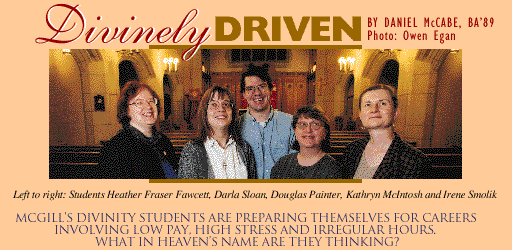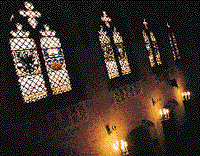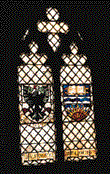 |
 | ||
 | |||
 | |||
 | |||

Darla Sloan says she and her fellow ministers-in-training don't have much choice about the course their lives have taken. "God just gets a hold of you."
No one was more surprised by her spiritual U-turn than Sloan. "I had actually been away from the church for 17 years," she says. Once she began attending church again, she found herself intensely drawn to religious service. "It began to take up more and more space in my life. It got to the point where I found it very difficult to separate the secular and the sacred in my life. It's not something I can only do on Sundays or in my spare time. My faith is my life."
Friends used to tell her she would make a good minister and she liked the idea of a career where she could help people. After becoming ill during the Christmas period, Smolik found herself doing some serious thinking. "I came to the conclusion that I wasn't going to do a PhD. I would study theology instead." So Smolik ventured where no saint or apostle has ever gone -- she turned to the world wide web. "I really wanted to go to Montreal and I was interested in McGill." After discovering that McGill had a theology program that was affiliated with the Anglican church, her course was set.
Influenced by the late Rev. Lionel Temple Hill, an Anglican minister she first met in St. Jean, Fraser Fawcett also wants to be a hospital chaplain. As part of her current training to become a minister, she works as a chaplain at the Royal Victoria Hospital.
"In fact, they're quite typical of ordinands [candidates for ordination] in North America. Ordinands are not only generally older than they used to be, they tend to be into their second careers. They've often had some kind of big life change that's cut them loose to think about this path. That life change is often tied to some sort of religious experience." Henderson adds that it's not unusual for divinity students to have "attended church A when they were young, moved away from that life and then start attending church B." The problem with that, says Henderson, is that it makes their training all the more difficult. "They often don't have deep roots in the tradition they're trying to live in." Still, Henderson says he believes this gener-ation of budding church leaders has an advantage over their predecessors in terms of their ability to reach out to the sceptical members of their faith. "They know very well what it's like not to be interested in the church, because at one point, they weren't interested in church themselves." Henderson is also the advisor for McGill's bachelor's program in theology. Some students pursue theology degrees out of an academic interest in the subject matter, but those who want to become ministers do both the theology and divinity degrees, almost always in affiliation with one of the three theological colleges which serve as McGill's partners in the training process: the Montreal Diocesan Theological College, the Presbyterian College and the United Theological College.
Their academic ability is scrutinized, as are their leadership and counselling skills. Psychologists probe their psyche to determine their mental fitness for the ministerships they seek. "One of the things you're judged on is how well you integrate all those aspects," says Kathyrn McIntosh, a candidate for ministry in the United Church. "You can't get away with compartmentalizing.You can do extremely well in the academic aspects of your training and still be refused in the end." The program isn't for the faint of heart. "You don't come here and get the fuzzies," says Smolik. "You know how people talk about throwing babies into the water so they'll learn how to swim? That's the way it feels sometimes." The ordinands like the fact that the Faculty of Religious Studies is part of a greater, very diverse McGill community. "It's more representative of the milieu in which we'll be working," says Sloan. "Society tends to be secular. You learn to be respectful of other people's views."
With a Jewish studies scholar as dean, professors specializing in Hinduism and Buddhism on faculty, and a large number of arts students from a variety of backgrounds as classmates, Douglas Painter, another ordinand, says the faculty is indeed a stimulating location to study theology. "That's the most exciting thing about McGill -- you're exposed to so many different ways of approaching God." Young people tend to regard organized religion with a sceptical eye, notes Henderson. According to polls, this is especially true in Quebec. "In terms of their views of organized religion, it ranges from mild hostility to just not having any interest at all." Henderson says that once young and wary arts students find themselves in a class with the ordinands, their opinions towards organized religion tend to soften. The ministers-in-training "serve as wonderful icons for organized religion. These are nice, approachable, open-minded, thoroughly decent people to know. They don't fit the stereotypes of organized religion -- they aren't monsters of manipulation and authoritarianism. I enjoy watching that interaction."
If financial security is not part of the picture, there are other kinds of rewards. "This is a very small community," says McIntosh. "We know each other at a deeper level than do the students in other parts of the University. The kind of exchange we engage in about spirituality tends to be more self-revelatory by its very nature." Most important, perhaps, is the sense of having found the right course -- or having it find you. "My friends used to ask me, 'What on Earth could have possessed you to give up a promising career in academia?'" recalls Sloan. "It's not a career choice I've made in any kind of conventional way. I really feel that I've been called to this life. "If this is nuts, leave me here," she adds. "I'm quite happy to be crazy if this is what it means to be crazy." This article is reprinted with permission from the McGill Reporter. | |||
 Not that long ago, Sloan was working towards a PhD in linguistics at Université Laval. A solid academic career was well within her grasp. Then one day, seized by an overwhelming notion that she was on the wrong path in her life, she shifted gears dramatically."It was like a lightning bolt," says Sloan, who is training to be a minister with the United Church. "That's the best way I could describe it."
Not that long ago, Sloan was working towards a PhD in linguistics at Université Laval. A solid academic career was well within her grasp. Then one day, seized by an overwhelming notion that she was on the wrong path in her life, she shifted gears dramatically."It was like a lightning bolt," says Sloan, who is training to be a minister with the United Church. "That's the best way I could describe it."
 "It wasn't a lightning bolt for me, but I did come to the decision suddenly," says Irene Smolik, who is looking forward to a career as an Anglican minister. Smolik was in Calgary finishing her MA in sociology and contemplating doing a PhD. As a youngster she had gone to Mennonite and Pentecostal churches and was currently attending an Anglican parish.
"It wasn't a lightning bolt for me, but I did come to the decision suddenly," says Irene Smolik, who is looking forward to a career as an Anglican minister. Smolik was in Calgary finishing her MA in sociology and contemplating doing a PhD. As a youngster she had gone to Mennonite and Pentecostal churches and was currently attending an Anglican parish.
 Heather Fraser Fawcett grew up as a Presbyterian in Montreal, but became an Anglican when her family moved to St. Jean sur Richelieu which had no Presbyterian church. "Like a lot of young people, I left the church in my late teens and I didn't come back until I was in my 30s." She studied Zen Buddhism and did a degree in history and Canadian studies. She started attending a Unitarian Universalist Church and in 1994 became a chaplain, a position of spiritual leadership that requires a period of training within the denomination. She wants to hold a more senior position in her church now as a minister. She is drawn to interfaith work -- counselling couples from different religious backgrounds, for instance.
Heather Fraser Fawcett grew up as a Presbyterian in Montreal, but became an Anglican when her family moved to St. Jean sur Richelieu which had no Presbyterian church. "Like a lot of young people, I left the church in my late teens and I didn't come back until I was in my 30s." She studied Zen Buddhism and did a degree in history and Canadian studies. She started attending a Unitarian Universalist Church and in 1994 became a chaplain, a position of spiritual leadership that requires a period of training within the denomination. She wants to hold a more senior position in her church now as a minister. She is drawn to interfaith work -- counselling couples from different religious backgrounds, for instance.
 In their 30s and 40s, trained in other disciplines, often having experienced a period in their lives where they drifted away from religion, Sloan, Smolik and Fraser Fawcett are typical of the students in McGill's master's program in divinity, according to religious studies professor Ian Henderson.
In their 30s and 40s, trained in other disciplines, often having experienced a period in their lives where they drifted away from religion, Sloan, Smolik and Fraser Fawcett are typical of the students in McGill's master's program in divinity, according to religious studies professor Ian Henderson.
 Divinity students, who number about 12 per year, have to master a variety of courses dealing with the New Testament, the Old Testament, the philosophy of religion and church history, as well as electives that focus on other religious faiths. They have to master either Greek or Hebrew. They do religious community work in a variety of settings. They also have responsibilities to their own parishes and to the colleges with which they're affiliated.
Divinity students, who number about 12 per year, have to master a variety of courses dealing with the New Testament, the Old Testament, the philosophy of religion and church history, as well as electives that focus on other religious faiths. They have to master either Greek or Hebrew. They do religious community work in a variety of settings. They also have responsibilities to their own parishes and to the colleges with which they're affiliated.
 Smolik agrees. "The people here have the ability to speak and listen to each other in a respectful way. This isn't a typical Bible school and I like that about McGill." Constant contact with individuals who hold different views about religion "makes the experience more challenging. And faith needs to be challenged."
Smolik agrees. "The people here have the ability to speak and listen to each other in a respectful way. This isn't a typical Bible school and I like that about McGill." Constant contact with individuals who hold different views about religion "makes the experience more challenging. And faith needs to be challenged."
 Although the students receive some financial support for their studies from the theological colleges, money can be an issue. "They're receiving training for a profession where they'll never get rich," explains Henderson. "They simply cannot afford to incur debts. Someone studying medicine or law can make a cost/benefit analysis and decide that maybe it's worthwhile to incur debt. Our people will simply never be on the affluent side of society. And they already often have commitments. Many of them have children, for instance."
Although the students receive some financial support for their studies from the theological colleges, money can be an issue. "They're receiving training for a profession where they'll never get rich," explains Henderson. "They simply cannot afford to incur debts. Someone studying medicine or law can make a cost/benefit analysis and decide that maybe it's worthwhile to incur debt. Our people will simply never be on the affluent side of society. And they already often have commitments. Many of them have children, for instance."